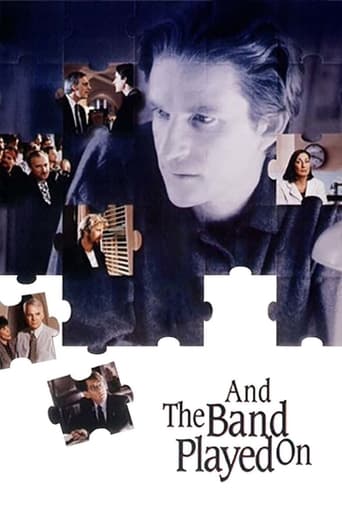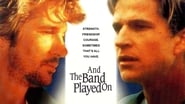csts1
What do you do when your entire worldview is shaken? The advent of a threatening disease that inexplicably dropped people in their tracks forces scientists, policy makers, medical experts and ordinary individuals to reevaluate fundamental assumptions. No one comes off totally unscathed in this gutsy, gritty movie. None of us want to hear upsetting news, nor do we want to discover the world isn't as safe as we thought it was. Heroes and villains abound and reveal complex nuances in this remarkable window on one of the most life-changing events in several generations. Brilliant script, brilliant acting and directing. We learn a lot about the world, ourselves and each other just by watching! Sombre, yes -- but one of my favorite movies of all time. A great example of how film can awaken us to new insights on issues we don't even realize that we haven't yet considered.
Robert J. Maxwell
HBO has this tendency to come up with occasional features that are intelligent, challenging, entertaining, and compelling, and this is one of them. They don't cost much money. I don't understand why Hollywood insists on grinding out senseless and unimaginative remakes of "The Karate Kid." Mathew Modine is a doctor at the Center for Disease Control in Atlanta who undertakes the study of an outbreak of a new disease, ultimately called AIDS. He and his team run into all sorts of problems in their pursuit of the lethal virus. And there are a host of other recognizable faces in the cast, some of them, like Steve Martin and Richard Gere, amounting to not much more than featured bits. That they would volunteer for a project like this is surprise enough.Modine's team consists of about half a dozen investigators hampered by underfunding but still resolute. The investigation is blocked or derailed by a number of individuals and social forces. I'm listing them in no particular order.The gay communities themselves are at first uncooperative. A suggestion by Modine and the San Francisco Board of Health that the bath houses that serve as gathering places for strangers is loudly protested (and defeated) by defiant gays who are described as "a vocal minority." They know there is a contagious and destructive disease about but they refuse to give up the bath houses that help spread it.AIDS turns out to be transmitted through blood transfusions but the corporate blood banks and the Red Cross refuse to use a test on their available supply because it is only 80% effective in detecting contamination and it would cost a great deal of money.The evangelicals, like Pat Robertson, are seen in video clips, claiming that AIDS is a scourge sent by God to cure the world of homosexuals. He wasn't alone in his sentiments. A candidate for mayor of Dallas at the time suggested that the best cure for AIDS was to take out all the homosexuals and shoot them.Ronald Reagan's administration cuts the budget for every social program, including the CDC, except for the Department of Defense, whose budget is increased beyond that requested by congress. Years pass before he mentions the epidemic publicly. The film doesn't show it, but Reagan's wife, Nancy, was more responsive and closer to the problem because one of her close friends, her hair dresser, died of AIDS.The media mostly fail to publicize the issue, even after it becomes clear hat it is a danger not just to gay men, but to women, hemophiliacs, new borns, Haitians, and anyone receiving a transfusion for any reason.Most interesting to me, as a scientist of sorts, was Robert Gallo, an ambitious virologist at the National Institutes for Health, who was a renowned scientist and whose organization had far more resources at its disposal than the CDC. The virus itself is discovered by the Pasteur Institute in Paris. And Gallo steals their samples and claims them as his own, so he gets to share the credit with those who actually discovered the virus and he wins all sorts of prizes and keeps his job. A professional committee is formed to investigate Gallo's shenanigans but is dissolved once the furor in the scientific community has faded enough. (The public was largely indifferent.) I'd have fired the SOB on the spot. In science, you don't ignore categorical imperatives in favor of hypothetical imperatives.I admired the film for its concentration on the investigation itself, without dwelling overmuch on the misery it caused. We can take it for granted, as adults, that death from AIDS is tragic in itself and rather more than that for the victims and those who love them. We see some of it, as we should, but not enough to obscure the main narrative. The sentimental element is handled with far better taste than it is in more expensive productions like "Philadelphia" or the documentary, "The Life And Times of Harvey Milk." Carter Burwell's fine score is subdued and apt.The performances are as professional as we might expect from such a cast. As far as that goes, it may be Richard Gere's most accomplished performance as the director and choreographer who "gets it" and is both depressed and scared stiff. How often do we see Richard Gere act genuinely frightened? Ian McKellan as an activist and Alan Alda as a spiteful egotist are outstanding.A couple of personal observations. I lived in San Francisco in the early 1980s when AIDS was still mostly a mystery. I visited the bath houses as well (with my wife) and found them anything but the kinds of places that resemble an Egyptian whorehouse in 1910. Each rented room is full of plumbing, cement, and steam. No beaded curtains or incense.It was also interesting, and I'm thinking like a behavioral scientist, to witness the reaction of the gay community. No doubt opinions were diverse, but the visible graffiti of the time prominently proclaimed that "AIDS is not a gay disease!" An important process in defining yourself as a victim is to also define the perpetrator. In claiming that AIDS was not a gay disease (which, in strict reality, it was not), the victims in the gay community could aim the rage caused by their fear at an ignorant public. It was only later, when it became clear that unsafe sex was a major means of transmission, that politicians and the Reagan administration could be blamed for ignoring the epidemic and contributing to the number of deaths. That's as it should be. The turning point seems to have been the demise of several celebrities, gay and straight, including Rock Hudson, Anthony Perkins, Arthur Ashe, and Rudolf Nureyev.A fascinating and tragic tale, not yet finished.
excalibur212
I was really disappointed to see how badly this movie was made. Obviously it was well received because of the subject matter, not due to the quality of the film itself. I lived and worked in Atlanta and have been to the CDC, and I can assure you no Georgians talk like the characters in this movie (mostly badly cast New York actors, with people like Richard Gere and Steve Martin brought in to do cameos). But this movie is just plain badly made, even for a TV movie. All the "stand up and shout" moments are clichéd one-liners ("How many people have to die before this disease is recognized?" "Do you mean to tell me, that they knew they were giving AIDS to people, and they continued to do it?" etc). At one point the researcher is drawing on a chalkboard and checking off items as if he's explaining it to a soccer mom, when the other character (supposedly another doctor) obviously wouldn't need the dumbed-down version the writers think the audience requires. It was like watching a bad play. I wish I knew of better AIDS movies out there. This is a really bad movie.





